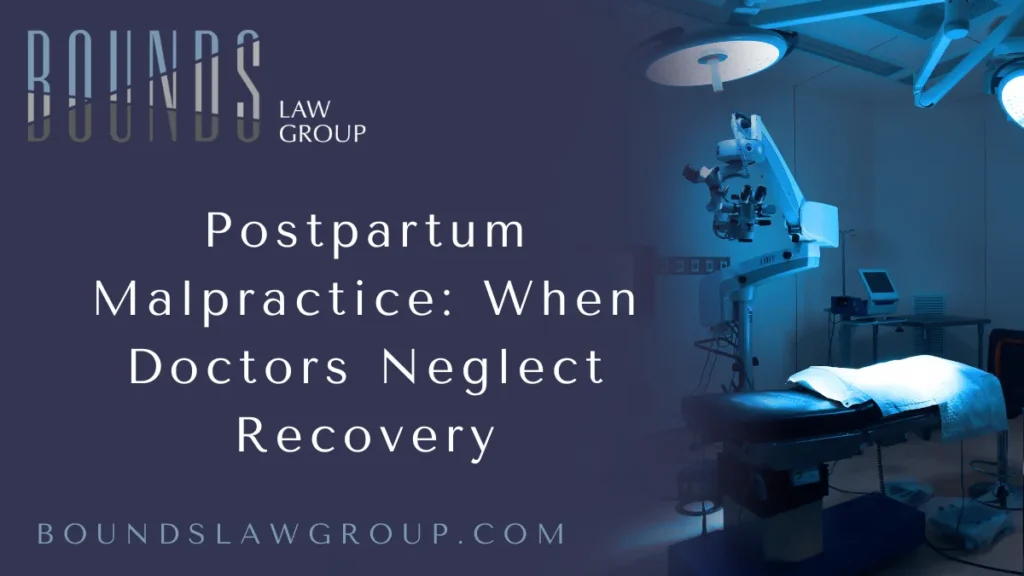
Fight for Justice with an Experienced Orlando Postpartum Malpractice Lawyer
The postpartum period—often referred to as the “fourth trimester”—is a vulnerable and critical phase for mothers. While childbirth itself presents numerous risks, the period following delivery is when many women face serious health complications. When doctors, nurses, or healthcare institutions in Orlando fail to provide adequate postpartum care, the consequences can be life-altering—or even fatal. At Bounds Law Group, our Orlando postpartum malpractice lawyer team is committed to holding negligent parties accountable and protecting the rights of mothers harmed during recovery.
If you or a loved one has suffered due to medical negligence after childbirth, it’s time to take action. Complete our free case evaluation form or call us now at 877-644-5122.
What Is Postpartum Malpractice?
Postpartum malpractice occurs when medical professionals fail to diagnose, monitor, or treat complications after childbirth, leading to serious injury or death. This form of malpractice may involve:
- Failure to monitor vital signs post-delivery
- Misdiagnosis of infections or internal bleeding
- Negligent discharge without proper instructions
- Failure to recognize postpartum depression or anxiety
- Ignoring signs of preeclampsia, hemorrhage, or sepsis
When these oversights happen, patients can suffer permanent damage—both physically and emotionally. That’s why it’s crucial to speak with an Orlando postpartum malpractice lawyer if you suspect negligence.

Common Postpartum Complications Caused by Negligence
Postpartum care demands vigilant monitoring and quick response to health changes. The following are common complications linked to medical negligence:
1. Postpartum Hemorrhage
One of the most dangerous yet often preventable complications is postpartum hemorrhage—excessive bleeding after childbirth. Healthcare providers must monitor for signs like a drop in blood pressure, increased heart rate, and abnormal discharge. When these signs are ignored, the patient could go into shock or even die.
2. Preeclampsia and Eclampsia
Preeclampsia doesn’t always end with delivery. Left untreated, it can develop into eclampsia, which causes seizures and strokes. Failure to monitor blood pressure or dismissing symptoms like swelling, headaches, or vision problems can lead to devastating consequences.
3. Infections (Sepsis)
Infections after childbirth must be identified and treated immediately. Negligent hygiene practices, misdiagnosing fever, or ignoring elevated white blood cell counts can cause sepsis, which is life-threatening if not handled quickly.
4. Mental Health Conditions
Postpartum depression and psychosis are serious and often overlooked conditions. When doctors fail to screen new mothers or dismiss their symptoms, the results can include self-harm or harm to the baby. Proper referral to mental health professionals is essential.
5. Surgical Complications
Mothers undergoing C-sections or episiotomies may face complications from poor wound care, surgical errors, or inadequate pain management. These issues must be tracked meticulously during postpartum recovery.
If any of these conditions were mishandled in your case, a skilled Orlando postpartum malpractice lawyer at Bounds Law Group is ready to fight for you.
How an Orlando Postpartum Malpractice Lawyer Can Help
Pursuing a medical malpractice claim can be overwhelming, especially during recovery. At Bounds Law Group, we are equipped to manage every legal aspect of your case so you can focus on healing. When you contact us, we will:
- Conduct a comprehensive investigation of your medical records
- Consult with expert witnesses in obstetrics and gynecology
- Gather evidence to prove that the standard of care was breached
- Negotiate settlements or pursue litigation on your behalf
- Recover compensation for medical expenses, lost wages, emotional distress, and long-term disability
We understand the emotional trauma involved in postpartum malpractice cases. You are not alone. Let an experienced Orlando postpartum malpractice lawyer advocate for your rights.
Proving Medical Negligence in Postpartum Cases
To succeed in a postpartum malpractice claim, our legal team must demonstrate four critical elements:
- Duty of Care – The doctor or medical staff had a legal responsibility to provide a standard level of care.
- Breach of Duty – That responsibility was not met due to actions or inactions.
- Causation – The breach directly caused the injury or harm.
- Damages – There are measurable consequences like physical injury, emotional suffering, or financial loss.
At Bounds Law Group, we know how to build compelling cases that meet these legal standards and secure justice for our clients.
Who Can Be Held Liable for Postpartum Malpractice?
Several individuals or entities may be held accountable for negligent postpartum care, including:
- Obstetricians and Gynecologists
- Hospital staff and nurses
- Anesthesiologists involved in C-sections
- Hospitals or clinics that fail to enforce safety protocols
- Pharmaceutical providers who dispense incorrect medications
Our Orlando postpartum malpractice lawyer team will identify all liable parties and take aggressive action to hold them accountable.
What Is the Statute of Limitations in Florida for Medical Malpractice?
In Florida, the statute of limitations for medical malpractice is generally two years from the date the patient discovered—or should have discovered—the injury. However, some exceptions may apply in the case of concealed negligence or if the victim is mentally incapacitated.
To protect your right to compensation, speak to an Orlando postpartum malpractice lawyer as soon as possible.
Why Choose Bounds Law Group for Your Postpartum Malpractice Case
With decades of experience in medical malpractice litigation, Bounds Law Group has a proven record of success in holding negligent healthcare providers accountable. Our team offers:
- Personalized attention to every client
- Aggressive representation against hospitals and insurers
- Deep knowledge of Florida medical malpractice law
- No upfront fees – we don’t get paid unless you do
Let us fight for the justice and compensation you deserve. Complete our free case evaluation form or call us now at 877-644-5122 to discuss your case confidentially.
What Compensation Can You Recover?
Victims of postpartum malpractice may be eligible to recover compensation for:
- Current and future medical expenses
- Loss of income and diminished earning capacity
- Physical pain and emotional suffering
- Permanent disability or disfigurement
- Wrongful death damages if a loved one was lost
Our Orlando postpartum malpractice lawyer team will fight tirelessly to maximize your recovery and restore your sense of justice.

Take Action Today – Your Health and Your Future Matter
If you believe your injury or suffering was caused by negligent postpartum care, now is the time to act. Your case deserves immediate legal attention, compassionate support, and aggressive advocacy. At Bounds Law Group, we are proud to stand beside mothers who were failed by the medical system.
Complete our free case evaluation form or call us now at 877-644-5122. Let us help you seek the justice you deserve.
How to Identify If You’ve Experienced Postpartum Malpractice
It can be difficult for new mothers to recognize when their postpartum care falls below acceptable standards, especially during a period of physical and emotional recovery. However, there are warning signs that can indicate postpartum malpractice. Here are some key indicators that may suggest medical negligence:
1. Lack of Follow-up Care
A critical element of postpartum recovery is scheduled follow-up appointments with healthcare providers to monitor the mother’s health after childbirth. These visits are essential for detecting any complications, such as infection, bleeding, or mental health concerns. If your doctor failed to schedule these visits, or if follow-up care was inadequate, this could be a sign of negligence.
2. Unexplained or Prolonged Pain
Postpartum pain is normal, especially after a cesarean section or episiotomy. However, if the pain is severe, unexplained, or persists longer than expected, it could be a symptom of a complication such as an infection, a retained placenta, or surgical injury. Failure to properly address or investigate the cause of prolonged pain can be an indication of malpractice.
3. Unaddressed Mental Health Concerns
Postpartum depression, anxiety, and even psychosis are common but serious conditions that require proper treatment and support. If you or your healthcare provider did not discuss mental health during your postpartum visits or if your concerns were dismissed, it could be considered negligence. Failure to diagnose or treat mental health conditions is often a form of medical malpractice, as these conditions can worsen without professional intervention.
4. Discharge Despite Clear Risk Factors
In some cases, doctors may prematurely discharge mothers who are not ready to leave the hospital or birthing center. For example, discharging a mother with signs of infection, high blood pressure, or heavy bleeding is a breach of the duty of care. This could result in the patient worsening and requiring urgent medical intervention later, which could have been avoided if proper monitoring had been conducted.
5. Miscommunication About Postpartum Instructions
When leaving the hospital, mothers should receive clear, thorough instructions on how to care for themselves during recovery. This includes advice on managing pain, monitoring for signs of infection, and when to seek medical help. If instructions were vague, incomplete, or not provided at all, it may point to a failure in providing adequate care.
If you notice any of these signs or if your recovery was marked by unexpected complications, it is important to consult with an experienced Orlando postpartum malpractice lawyer. We can assess whether medical negligence played a role in your experience and help you understand your legal rights. Don't let a failure in your healthcare provider’s duty of care go unchallenged.
Take Action Today – Your Health and Your Future Matter
If you believe your injury or suffering was caused by negligent postpartum care, now is the time to act. Your case deserves immediate legal attention, compassionate support, and aggressive advocacy. At Bounds Law Group, we are proud to stand beside mothers who were failed by the medical system.
Contact us today through our free case evaluation form or call 877-644-5122.
Sources
- Centers for Disease Control and Prevention (CDC) – Pregnancy-Related Deaths
Offers national data on maternal deaths and contributing medical conditions.
https://www.cdc.gov/reproductivehealth/maternal-mortality/index.html - The American College of Obstetricians and Gynecologists – Postpartum Care
Clinical guidelines for proper postpartum care and warning signs.
https://www.acog.org/clinical/clinical-guidance/committee-opinion/articles/2018/05/optimizing-postpartum-care - National Institutes of Health (NIH) – Postpartum Complications
In-depth resource on medical issues following childbirth and standard treatment protocols.
https://www.ncbi.nlm.nih.gov/books/NBK507876/

